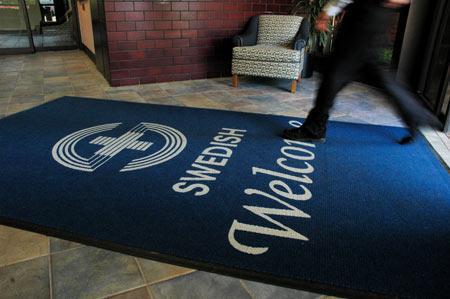Swedish Hospital becoming a clinic
Changes in the community and millions of dollars in losses are behind the change from inpatient to outpatient treatment for the Swedish Medical Center Ballard campus. <b> Photo by Dean Wong</b>
Wed, 05/10/2006
Swedish Medical Center has recommended a shift from inpatient to outpatient services at the Ballard campus, citing millions of dollars in losses and a need to change with an evolving community, said Kevin Brown, Swedish vice president for strategic planning.
In part, the decision was based on a community survey conducted by Swedish last year that showed a much younger demographic in Ballard than in the past. Other studies projected flat population growth in Ballard during the next five to 10 years.
The Ballard campus has "consistently lost about $5 million a year for the last several years and the services offered haven't been reevaluated since the 1950s, said Brown,
"If we do nothing then we'll have nothing," he said. "We are positioning the hospital for the next 50 years. We need to change with the evolving marketplace."
Some Ballard residents have criticized the plan, saying that the numbers showing stagnant population growth don't add up.
"Ballard is definitely growing," said Jody Grage Haug of the Ballard District Council. "There's something like 1,100 new housing units just in central Ballard."
Brown said Swedish looked at school enrollment trends and data from a national population analysis company, which found that growth in Ballard would only be about 1 percent a year, or about 1,000 people.
Limited by its geography, Ballard is developing vertically, but there isn't much potential for horizontal growth, said Brown.
It isn't just population growth that some feel Swedish has miscalculated. The hospital's birth as a community driven, grass-roots project has given many residents a sense of ownership in the hospital, Haug said.
"Ballard Hospital was a real community effort," said James Ballo, a urologist who has kept his practice in Ballard since 1975. "People went door-to-door collecting donations to build it."
In 1928 during a rapid population growth, Ballard residents created the Ballard Community Hospital. The current building was built in 1954 after a group of about 400 community members solicited funds door-to-door. Swedish Medical Center bought the hospital in 1992.
The hospital has seen a steady decline in inpatient services, while competition from other hospitals has been increasing. This, coupled with demographic shifts to a younger majority, made the changes necessary, said Brown.
Under the plan, the Ballard branch would move its services away from a full service acute-care inpatient hospital to a "comprehensive ambulatory center with low intensity inpatient services." It would offer physical and occupational therapy and outpatient surgery. Patients could stay in the hospital for a few nights but would not get long-term care.
Some services would be cut all together. Swedish recommends keeping the emergency room open but closing the Transitional Care Unit (TCU) and the Intensive Care Unit (ICU), citing low inpatient numbers.
Swedish is awaiting approval for the plan from its board of Trustees, which could come in June, said Brown.
"An implementation timeline has not yet been laid out," he said, "but in any scenario, we are moving aggressively to enhance our outpatient services."
The absence of long-term care will be hardest on the elderly who will have to travel outside of the community for care or to visit sick family members, said Ballo.
And like Haug, Ballo is not convinced that Ballard's population isn't significantly growing.
"We wonder about some of their numbers," he said. "Anyone can spout numbers and back them up, but they are always suspect in my opinion."
As services are eliminated at the hospital, so will some of the 440 full-time equivalent staff positions. Brown said the company plans to transfer and retrain as many employees as possible for openings at other Swedish branches.
"We're trying to be open and honest with the staff in the planning process," he said, "and we're working very hard to minimize any disruption."
Despite that assurance, some employees are worried about their future with the company.
Annie Wilkins, an ICU nurse at the Ballard branch for the past 26 years, said she is skeptical that those who lose their jobs will be absorbed into the Swedish system.
"I don't think they have thought this thing through," said Wilkins. "I think it's good that they are being honest with us, I just don't know that their conclusions are on solid ground."


